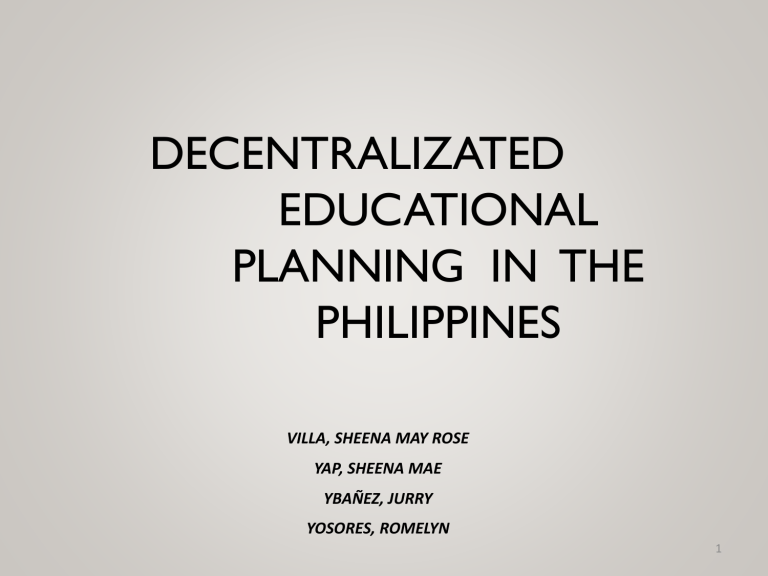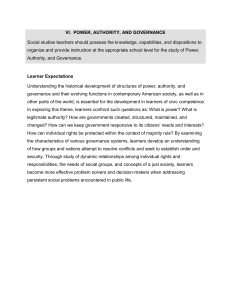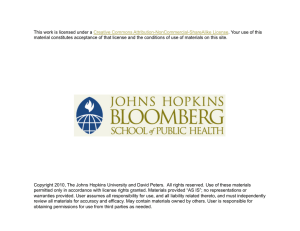Decentralized Educational Planning in the Philippines.
advertisement

DECENTRALIZATED EDUCATIONAL PLANNING IN THE PHILIPPINES VILLA, SHEENA MAY ROSE YAP, SHEENA MAE YBAÑEZ, JURRY YOSORES, ROMELYN 1 OVERVIEW OF THE PHILIPPINE EDUCATIONAL SYSTEM 2 EDUCATIONAL GOVERNANCE Higher Education Commission on Higher Education handles 4 years post secondary and advance degrees Technical and Vocational Training Technical Education and Skills Development Authority (TESDA) 2‐years post secondary Basic Education Department of Education handles 10 years of primary/elementary and secondary education schooling and some pre‐school classes 3 WHAT IS DECENTRALIZATION? WHY PURSUE DECENTRALIZATION IN THE PHILIPPINES? Educational Situation: • Poor quality of education • Shortfalls in classrooms • Shortfalls in textbooks and teachers • Low achievement in science, math and language • Disparity in rural and urban areas in terms of achievement • Declining participation of the private sector 5 SOME REASONS FOR DECENTRALIZATION REFORM PROGRAMS WITH RECOMMENDATIONS ON DECENTRALIZATION • EDCOM (1991) – Trifocalization of education for improved governance – Undertook the assessment of the education system of the country • Phil Education Sector Study (1998) – Saw the demand for local institutions for autonomy from central government to enable them to become more responsive to local problems • Phil Commission on Education Reform (2000) • RA 7160‐ Local Government Code of 1991‐ expanded the participation of stakeholders in education 1 2 EDUCATION REFORM RECOMMENDATIONS • Promotion of school‐based management as a system of empowering the school to provide leadership and for the community that serves to have ownership of the school • The trifocalization of education was intended to guarantee concentration on basic education and effectiveness in the delivery of basic education 6 ASPECTS OF DECENTRALIZATION • Decentralization aims to widen decision making while increasing responsibility and accountability. • The Local Government now plays a role in: – Construction, repair and maintenance of school buildings and other facilities of public elementary and secondary schools; – Establishment and maintenance of extension classes when necessary – Sports activities at the division, district, municipal and barangay levels LEGAL BASIS OF EDUCATION DECENTRALIZATION: GOVERNANCE OF BASIC EDUCATION ACT (GOBEA) 2001 Section 2, Declaration of Policy states, …school shall be at the heart of the formal education system. It is where children learn. Schools shall have a single aim of providing the best possible education for all learners and the state shall encourage local initiatives for improving the quality of basic education. The state shall ensure that the values, needs and aspirations of a school community are reflected in the program of education for the children, out of school youth and adult learners. Schools and learning centers shall be empowered to make decisions on what is best for the learners they serve… LEGAL BASIS OF EDUCATION DECENTRALIZATION: GOVERNANCE OF BASIC EDUCATION ACT (GOBEA) 2001 Section 3, Purposes and Objectives sets out in b), …define the roles and the responsibilities of, and provide resources to the field offices which shall implement educational programs, projects and services in the communities they and in d), …ensure schools and learning centers receive the kind of focused attention they deserve and that educational programs, projects and services take into account the interests of the community… and in e) …encourage schools and learning centers to reflect the values of the community by allowing teacher/learning facilitators and other staff to have flexibility to serve the needs of all learners… LEGAL BASIS OF EDUCATION DECENTRALIZATION: GOVERNANCE OF BASIC EDUCATION ACT (GOBEA) 2001 • The Act leaves the organizational structures to implement these policies, purposes and objectives open, to be proposed by the Secretary, and to be agreed with the relevant offices including that of the President, the Civil Service Department and Department of Budget and Management 10 Directive Mainstream L E A R N E R R E Q U I R E M E N T S Manage ment, Planning, Standard Setting, QA and M &E Public‐ Private Alliances Administrative Services Basic Education Programs & Services Research and Evaluation HR Services Performance Feedback Finance & Audit Services Performance Management Reporting ICT Services Legal Services 11 DEM FRAMEWORK • The directive layer of the process provides the overall direction to all the activities and services of the Department. It includes activities and processes like policy formulation and setting standards, quality assurance, setting the overall strategic directions of the entire department to ensure achievement of its vision and mission. • The mainstream layer consists of the major processes and activities, which directly address the requirements of the learners. It covers processes and programs on ensuring private‐public network and alliances, delivery of the basic education services which include pre‐school, elementary, secondary ALS, special education, science and technology and technical/vocational high schools. Performance feedback and management reporting mechanisms form part of the mainstream layer to ensure continuous process improvement and informed management decisions. • The supportive layer provides the major support processes to the mainstream programs and activities. The Administrative processes include procurement services. SHARED GOVERNANCE PRINCIPLE • Shared Governance is a principle which recognizes that every unit in the education bureaucracy has a particular role, task and responsibility inherent in the office and for which it is principally responsible for outcomes. PRINCIPLES • Section 3.1 Principle – Shared governance is a principle which recognizes that every unit in the education bureaucracy has a particular role, task and responsibility inherent in the office and for which it is principally responsible for outcomes. • Section 3.2 The principles of accountability and transparency shall be operationalized in the performance of functions and responsibilities at all levels of governance. • Section 3.3 The process of democratic consultation shall be pursued as the decision‐making process at appropriate levels. Whenever feasible, stakeholders shall be consulted on matters that affect the welfare and instructional needs of the learners. • Section 3.4 The communication channels of field offices shall be strengthened to facilitate flow of information and expand linkages with other governmental agencies, local government units and nongovernmental organizations for effective governance. • Feedback mechanism shall be established to ensure coordination and open communication among the central office, the regional, division, district and schools/learning center levels. DUTIES AND RESPONSIBILITIES IN A DECENTRALIZED ENVIRONMENT National Office : (1) Formulating national educational policies; (2) Formulating a national basic education plan; (3) Promulgating national educational Standards; (4) Monitoring and assessing national learning outcomes; (5) Undertaking national educational research and studies; (6)Enhancing the employment status, professional competence, welfare and working conditions of all personnel of the Department; and (7)Enhancing the total development of learners through local and national programs and/or projects. DUTIES AND RESPONSIBILITIES IN A DECENTRALIZED ENVIRONMENT Regional Office : Consistent with the national educational policies, • • • • • • • plans and standards, the regional director shall have authority, accountability and responsibility for the following: (1) Defining a regional educational policy framework which reflects the values, needs and expectations of the communities they serve; (2) Developing a regional basic education plan; (3) Developing regional educational standards with a view towards bench‐ marking for international competitiveness; (4) Monitoring, evaluating and assessing regional learning outcomes; (5) Undertaking research projects and developing and managing region wide projects which may be funded through official development assistance and/or or other finding agencies; (6) Ensuring strict compliance with prescribed national criteria for the recruitment, selection and training of all staff in the region and divisions. (7) Formulating, in coordination with the regional development council, the budget to support the regional educational plan which shall take into 16 DUTIES AND RESPONSIBILITIES IN A DECENTRALIZED ENVIRONMENT • • • • • • • Regional Office (8) Determining the organization component of the divisions and districts and approving the proposed staffing pattern of all employees in the divisions and districts; (9) Hiring, placing and evaluating all employees in the regional office, except for the position of assistant director; (10) Evaluating all schools division superintendents and assistant division superintendents in the region; (II) Planning and managing the effective and efficient use of all personnel, physical and fiscal resources of the regional office, including professional staff development.; (12) Managing the database and management information system of the region; (13) Approving the establishment of public and private elementary and high schools and learning centers; and (14) Preforming such other functions as may be assigned by proper authorities. Duties and Responsibilities in a Decentralized Environment The DepED Division Office: A division shall consist of a province or a city which shall have a schools division superintendent, at least one assistant schools division superintendent and an office staff for programs promotion, planning, administrative, fiscal, legal, ancillary and other support services. DUTIES AND RESPONSIBILITIES IN A DECENTRALIZED ENVIRONMENT • The DepED Division Office: (1) Developing and implementing division education development plans; (2) Planning and managing the effective and efficient use of all personnel, physical and fiscal resources of the division, including professional staff development; (3) Hiring, placing and evaluating all division supervisors and schools district supervisors as well as all employees in the division, both teaching and non‐ teaching personnel, including school heads, except for the assistant division superintendent; (4) Monitoring the utilization of funds provided by the national government and the local government units to the schools and learning centers; (5) Ensuring compliance of quality standards for basic education programs and for this purpose strengthening the role of division supervisors as subject area specialists; (6) Promoting awareness of and adherence by all schools and learning centers to accreditation standards prescribed by the Secretary of Education; (7) Supervising the operations of all public and private elementary, secondary and integrated schools, and learning centers; and (8) Performing such other functions as may be assigned by proper authorities. DUTIES AND RESPONSIBILITIES IN A DECENTRALIZED ENVIRONMENT Schools District Level Upon the recommendation of the schools division superintendents, the regional director may establish additional schools district within a schools division. School districts already existing at the time of the passage of the law shall be maintained. A schools district shall have a schools district supervisor and an office staff for program promotion. • The schools district supervisor shall be responsible for: • (1) Providing professional and instructional advice and support to the school heads and teachers/facilitators of schools and learning centers in the district or cluster thereof; • (2) Curricula supervision; and • (3) Performing such other functions as may be assigned by proper authorities. THE SCHOOLS DISTRICT LEVEL Section 8.1 Powers, Duties and Functions The Schools District Level – A schools district shall have a schools district supervisor and an office staff for program promotion. In consonance with the policy, purposes and objectives, and the principles enunciated in R.A. 9155 the school districts shall have the following authority, accountability and responsibility: 1. Monitor, assess, supervise and evaluate the implementation of various curricula in basic education in both public and private schools/learning centers including early childhood education, special education and alternative learning system in the district or cluster thereof 2. Provide professional and instructional advice and support to the school heads and teachers/facilitators of public and private elementary and secondary schools and learning centers including early childhood education, special education and alternative learning system in the district or cluster thereof 3. Perform such other related functions as maybe assigned by proper authorities. SCHOOL DISTRICT LEVEL A school district already existing at the time of the passage of this Act shall be maintained. However, an additional school district may be established by the regional director based on criteria set by the Secretary and on the recommendation of the schools division superintendent. For this purpose, the Secretary of Education shall set standards and formulate criteria as basis of the Regional Director in the establishment of an additional school district. DUTIES AND RESPONSIBILITIES IN A DECENTRALIZED ENVIRONMENT School Level • There shall be a school head for all public elementary schools and public high schools or a cluster thereof. The establishment of integrated schools from existing public elementary and public high schools shall be encouraged. • The school head, who may be assisted by an assistant school head, shall be both an instructional leader and administrative manager. The school head shall form a them with the school teachers/learning facilitators for delivery of quality educational programs, projects and services. A core of nonteaching staff shall handle the school's administrative, fiscal and auxiliary services. DUTIES AND RESPONSIBILITIES IN A DECENTRALIZED ENVIRONMENT • • • • • • School Level (1) Setting the mission, vision, goals and objectives of the school; (2) Creating an environment within the school that is conducive to teaching and learning; (3) Implementing the school curriculum and being accountable for higher learning outcomes; (4) Developing the school education program and school improvement plan; (5) Offering educational programs, projects and services which provide equitable opportunities for all learners in the community; (6) Introducing new and innovative modes of instruction to achieve higher learning outcomes;



